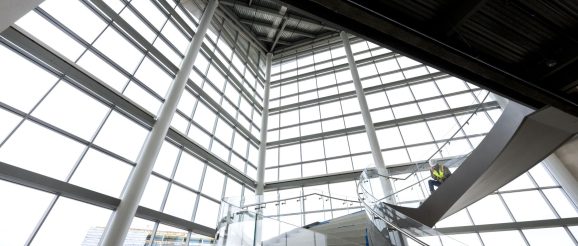Air Force Academy visitors center, hotel and innovation building near completion

Rising outside the Air Force Academy’s north gate, wrapped in a waterproof membrane and aluminum skin, the new Hosmer Visitor Center is expected to be finished in May. Then work will begin to fill the space with exhibits to help visitors understand cadet life and training, such as piloting gliders and running the intense obstacle course in basic training, said Lisa Neener, visitor experience and STEM outreach chief for the academy. “The exhibits we have planned for this space are going to be awe-inspiring,” she said. Visitors will enter the new building through a wide oval, meant to evoke the tail-pipe of a jet and walk through a building meant to symbolize a wing in flight. At its southern end the building opens up into a grand atrium 110 feet high with stunning views on clear days, officials said. The unusual design and shape of the building, including odd angles, was a challenge in construction and the contractor worked through seven months of discussions focused on how to turn the designs into a building, said Kendall Dietzius, a project manager for GE Johnson. The building will replace a visitor center from the 1980s and it is expected to open to the public in December 2025. The project faced delays in its financing because the bond market collapsed in March 2020. The construction got underway in 2022. Once open, Neener expects the center will drive a significant jump in visitation from about 400,000 people a year to about 1 million. The boost will achieve one of the main goals of the state financing the project received as part of the City for Champions project — increasing tourism and sales tax generation. The building is the last City for Champions project to go up. The state also provided financing for the U.S. Olympic & Paralympic Museum, the Hybl Sports Medicine and Performance Center, Ed Robson Arena and Weidner Field. Hotel Polaris to open in November The new visitor center is a key portion of a much larger 57-acre project that also features the 375-room Hotel Polaris across the road. The nine-story hotel, expected to open in November, will be the city’s second largest after The Broadmoor. It will offer a full service spa, conference space, jet flight simulators, and six different dining options open to the public, including a 1950s style soda shop, said Curtis Bova the hotel’s general manager with Greenwood Village-based CoralTree Hospitality. The building’s owners, Provident Resources Group, a Louisiana-based nonprofit, is expected to transfer the building to the Air Force Academy Foundation once the bonds are paid off in about 15 years, said Mark Hille, CEO of the foundation and the Association of Graduates. Once the transfer happens, the hotel will generate tens of millions for the foundation and projects that provide an excellent experience at the school, such as the school’s new Madera Cyber Innovation Center. While West Point has a similar nearby hotel to serve it, it is owned by a private company and does not generate revenue to directly benefit the school, Hille said. Innovation Center aims for 2025 completion On the academy’s campus, the new $58 million cyber innovation center is also taking shape, with a large new concrete spiral staircase running through the 49,000-square-foot building of labs and classrooms. James Maher, deputy department head of the Department of Computer and Cyber Science, said every freshman will pass through the building for a class focused on artificial intelligence, cyber security and big data concerns. The building will also have a secure area where cadets will have a chance to observe real Air Force challenges with hacking and artificial intelligence. Maher expects it will look like a realistic war room and cadets will have access to data from real-world conflicts that they can re-enact, he said. “It will give them that experience of fighting in real wars,” he said. Right now, the academy does not have a large enough secure area for those kinds of projects, he said. Cadets will also use the facility for drone research, allowing them to fly them more consistently no matter the weather. The testing is currently focused on autonomous systems research and swarming, which allows the drones to work in coordination with each other and ground units, he said. The building will also house Air Force CyberWorx, an innovation lab focused on rapidly prototyping new solutions for service members. “We have four different focus areas that we are interested in, that being cyber, innovation, operations optimization and emerging technology. This facilitates all those different areas,” said Col. Bert Giovannetti, director of CyberWorx.
